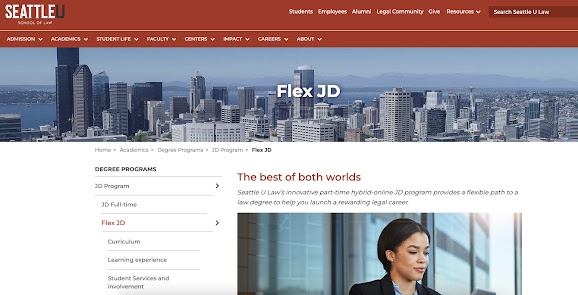Good news today. Aspen Publishing wants to do a new edition of our Evidence book.
Thursday, November 30, 2023
Coming in the Near Future: New Edition of Evidence Book
Friday, November 24, 2023
Working and Want a Law Degree--Flex JD Program
Beginning this Spring Seattle University Law School will offer my Comprehensive Pretrial Advocacy Flex JD course. It is a 4-credit course. Flex JD courses are designed for students who are working. They are hybrids—for example, my Pretrial Advocacy course involves one synchronous online Zoom session per week running from 6 to 7:30 p.m. and two in-person weekends at the law school. Students in the Flex JD program can graduate in four, rather than three, years.
The curriculum of my course while organized to fit this pattern will cover the same material and experiences that an in-person at the law school course covers. One big difference is that students will be interacting with and submitting work on a very robust Canvas web page.
The text for the course is my Pretrial Advocacy: Planning, Analysis and Strategy 6th edition, which is being published by Aspen Publishing.
Monday, November 13, 2023
Cross-Examining Donald Trump
Trump is currently in trial in the Trump civil fraud trial. He was called to the stand by the Attorney General’s office in the civil fraud trial. In a criminal trial, the government cannot call the defendant to testify because the defendant has a 5th Amendment right. In this civil case, however, the government could and did call the defendant Trump to testify, and defendant Trump could have exercised his 5th Amendment right. However, in the civil case, the factfinder (in this bench trial, Judge Engoron) could draw an adverse inference if defendant Trump were to take the 5th. For example, if Trump refused to answer a question posing that he inflated the price of a piece of real estate, the judge could infer that he did inflate the price.
Why did the AG call Trump as a witness? It was because Trump had to admit facts supporting the government’s case, such as heading his business and ownership of his real estate, and so on.
That brings us to the question—why didn’t the defense cross-examine Trump? First off, this is not the usual cross-examination. The usual cross involves counsel examining the other side's witness, using cross to elicit concessions and/or impeach the witness.
Here, however, defense counsel is questioning the defendant, and ordinarily, the defense attorney would ask the defendant open-ended questions allowing the defendant to lay out information favorable to the defense case. This assumes that the defendant would benefit the defense case with the helpful testimony. Also, this assumes that the defendant is a normal person and a person who has at least a scintilla of information that would benefit the defense.
In this case, however, the defense, when defense counsel was offered the opportunity to examine Trump and gather beneficial evidence, defense counsel responded, “No questions.” Normally, defense counsel says “No questions” when the witness has not hurt the defense case and cannot benefit by asking any questions.
Here, on the other hand, the defense risked that defendant Trump would further build the government’s case. Watch this interview with former US Attorney Chuck Rosenberg.
Tuesday, November 7, 2023
Book Review: "Companion to Enduring Cross-Examination Texts"
I wanted to share Munish Bharti's kind review of Cross-Examination Handbook. It reads as follows:
5.0 out of 5 stars Essential Companion to Enduring Cross-examination Texts
Cross-examination has been described as “the greatest legal engine ever invented for the discovery of truth.” JOHN H. WIGMORE, 5 WIGMORE, EVIDENCE §1367, at 32 (Chadbourn rev. 1974). Yet, according to authors Clark, Dekle, Sr., and Bailey, “[t]oo few trial lawyers are good at cross-examination.”
Readers rejoice: this book provides the building blocks for preparing and conducting winning cross-examinations. This book explains the concession-seeking cross, basic impeachment concepts, and how to use visuals and exercise control over the recalcitrant, unruly witness.
This book is an essential companion to:
(1) LARRY POZNER AND ROGER J. DODD, CROSS-EXAMINATION: SCIENCE AND TECHNIQUES (LexisNexis 2d ed. 2004);
(2) FRANCIS L. WELLMAN, THE ART OF CROSS-EXAMINATION (Macmillan Co. 4th ed. 1936); and
(3) JAMES H. MCCOMAS, DYNAMIC CROSS-EXAMINATION: A WHOLE NEW WAY TO CREATE OPPORTUNITIES TO WIN (Trial Guides 2011).



